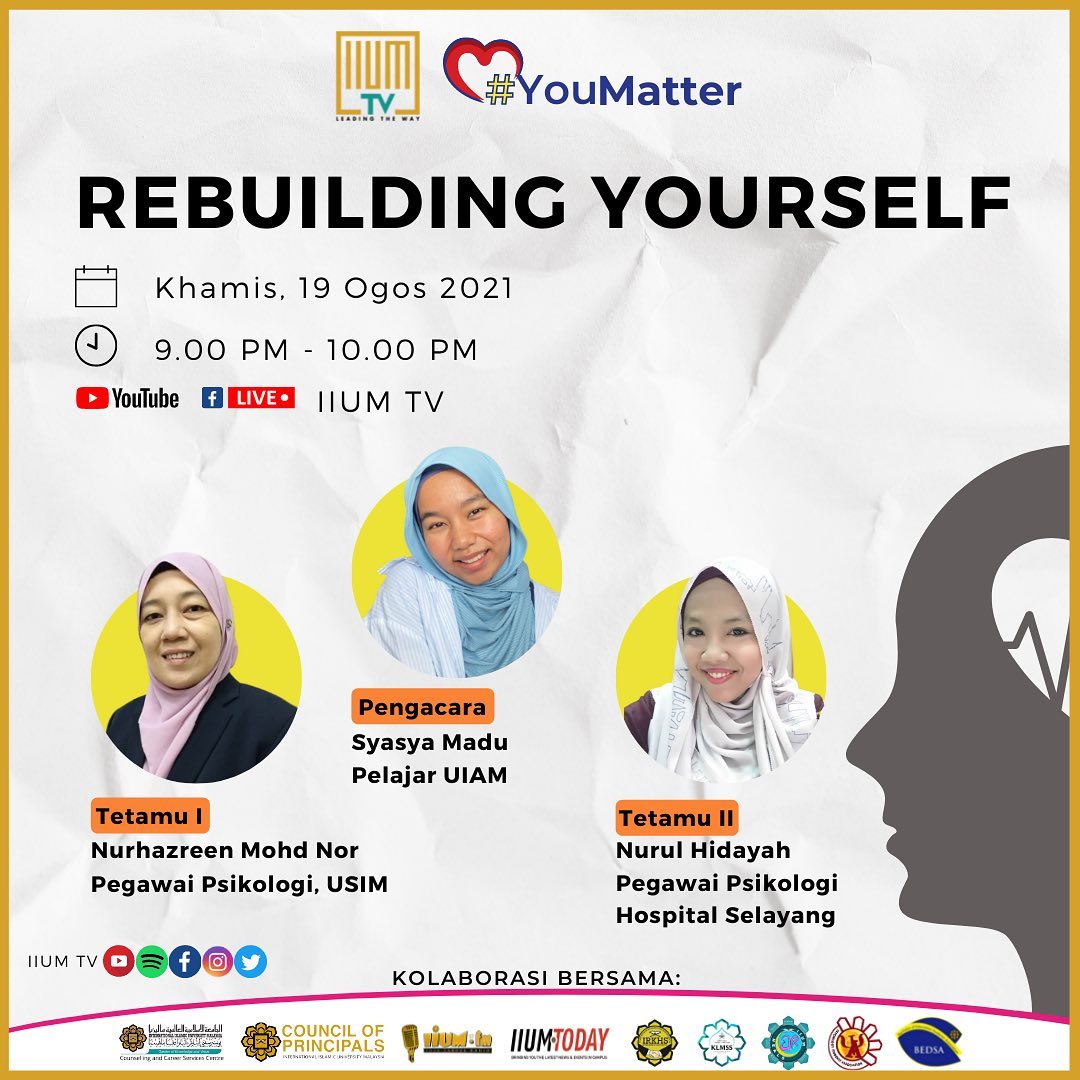By Dhiya Damia Zuhairul
GOMBAK, 20 August 2021: We will never know when the COVID-19 pandemic will end, but we sure need to move on with life with new norms. So, what is our direction after this pandemic? How do we rise after almost two years of facing this health crisis?
These issues were discussed by two psychologists from Universiti Sains Islam Malaysia (USIM) and Hospital Selayang.
IIUMTV, in collaboration with COPS, CCSC, IIUMFM, IIUMToday, PSYCTA, KLMSS, HEALS, BEDSA, IRKHSSS presented Series 7 #YouMatter: Rebuilding Yourself.’
Dr. Nurhazreen and Dr. Nurul Hidayah, who are both psychologists in Universiti Sains Islam Malaysia (USIM) and Hospital Selayang, have been invited to give their opinions on this matter. The programme was moderated by Syasya Madu, an English major student of IIUM.
The moderator started by asking how do we remain optimistic with the case of COVID-19 kept rising to the peak even though majority of the citizens have been vaccinated.
Dr. Nurhazreen said that we have to accept the situation and be fully open-minded. Consequently, when our mind had approved of the situation, the next approach would be to do the ‘fi-ra-sat’ concept in our daily life, which are ‘fikir’, ‘rasa’, and ‘buat’.
“We have to know what is really COVID and the situation, and also the effects, then , we have to ‘rasa’, feel the danger if we don’t follow the standard operating procedures (SOP) during this pandemic and expose ourselves to the danger of COVID-19. ‘Buat’ means that we have to practise what we preach by following the SOP set by the government. That is how we can be optimistic in this current situation,” she said.
Meanwhile, Dr. Nurul Hidayah asserted that in relation to that our mindset could affect our life, we have to change our mindset first. She said, “We have to be wise by having to change, accept, and let go. If we don’t accept our situation, our life would not be improved. People who can adapt to any change in their life are smart people.”
The moderator continued the discussion by asking both speakers on how COVID-19 affect their professional life as a psychologist.
“18 March 2020, the sacred date where the first pandemic started. I think everyone is affected. For me, as a counsellor, we even get affected by it. For example, I adapt to new psychological adaptations like working from home, meeting online, and having programmes and even counselling sessions online. Sometimes we get stressed too.” Dr Nurhazreen said that she gave some tips on how she could handle the stress of working from home by doing a work checklist on a daily basis.
Another equally important opinion of being a psychologist in Hospital Selayang, Dr. Nurul Hidayah, she stated, is that even though she is a psychologist, she needs to help the doctors to handle the patients too in terms of assisting and giving accurate information to the patient’s heirs in the ICU to avoid them from being panicked.
“One of the tasks that we do is we create a module which includes guidelines related to mental health for the patients and psychosocial response team in the hospital.”
As the cases are rising, it was being acknowledged that mental health issues are also rising during this pandemic, and Dr. Nurul Hidayah said that she agrees with the statement as there are many possible causes for this effect such as patients could not get medical supplies due to restriction of staying at home and the limitation of face to face counselling sessions.
To continue the discussion, both speakers were given chances to give their thoughts on the new announcement by the government on 19 August 2021 on the approval of certain restrictions in the economic and social sectors.
Dr. Nurul Hidayah said, “This could be our motivation to do many activities so that we could develop a positive mindset.” She also reminded the audience to find three blessings in our life daily so that we could be more grateful and motivated to live our life.
Consequently, “with working from home, some people find that this is their chance to relax their body and mind, and some people make it as an excuse to be a couch potato, what do you think?” the moderator asked Dr Nurhazreen.
“Resting is important, and it was said in Quran (40:61) where God has commanded His servant to rest at night and work in daylight.” She emphasise the Quranic statement by saying that our brain is like a battery that needs to be recharged every night by sleeping and resting in order to achieve a healthy brain.
In this session that lasted for 1 hour and 7 minutes, Dr. Nurul Hidayah and Dr. Nurhazreen gave their last few words to wrap up the discussion, starting with Dr. Nurhazreen.
She said, “Our life is like a graph that sometimes rises to the peak and sometimes drops low. However it is we who have to treat our lowest moments in life as a challenge, rather than a problem. Indeed, in the Quran Surah Al- Insyirah verse 5-6, Allah S.W.T. had mentioned that every hardship comes with ease.”
On another view, Dr. Nurul Hidayah highlighted, “We can practise the ABC technique in which A is to be ‘aware’ about yourself, B is to do a correct ‘breathing’ techniques whenever we are feeling anxious, C is to ‘calm’ ourselves, D is to ‘distract’ from negative things in our life and last but not least, E which is to ‘express’ our problems and not keeping it to ourself.”
The full discussion is available here: https://www.youtube.com/watch?v=DcxtiLCbbzI ***
